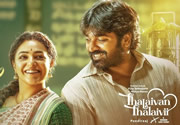Thalaivan Thalaivii
Synopsis:
The film centers on a towering political figure and the woman beside him, bringing to life a turbulent, emotional saga with committed performances and moments of genuine power. The lead actors deliver layered portrayals: the man’s charisma and contradictions are captured with careful restraint, while the woman’s ferocity — and vulnerability — is portrayed with an intensity that anchors the entire story. Their chemistry never relies on melodrama; instead, it builds through quiet scenes and volatile confrontations that reveal the personal costs of public life. Supporting turns add texture and occasional levity, with one comic performer offering timely relief without undermining the film’s gravitas.
Visually, the film is striking. Costume and production design convincingly evoke the periods it moves through, and the camera work favors close, intimate frames during private moments and broader, more composed compositions in public arenas, underscoring the contrast between the characters’ inner worlds and their public personas. The score is judicious, swelling when necessary and otherwise allowing silence to amplify tension. The editing is generally effective, though a couple of transitions between decades feel a touch abrupt; these are minor stumbles in an otherwise disciplined rhythm.
Narratively, the screenplay attempts a balancing act: it is part biographical epic, part intimate character study, and occasionally a political thriller. This blend mostly works because the film resists reductionist takes and allows its principals moral complexity. It examines ambition, loyalty, sacrifice, and the distortions power introduces into personal relationships. The pacing toward the middle slows as the film lingers on courtroom procedures and party dynamics, which some viewers may find dense, but these stretches reward attention with revelations about motivations and fractures within inner circles.
The film’s greatest strengths are its central performances and its willingness to portray its protagonists as flawed, flesh-and-blood people rather than icons. Scenes that dramatize the couple’s private conversations—often set against the backdrop of larger national events—are the most affecting, showing how national narratives intersect painfully with family life. Some dialogue leans toward the theatrical, especially in staged rallies or debates, but when the camera pulls back to intimate spaces, the writing sharpens and the emotions land.
There are political sequences that will spark debate: the filmmakers do not sanitize controversial episodes, and they offer perspectives that invite viewers to weigh competing truths. That courage to engage with thorny issues makes the film feel necessary, not merely celebratory. A few subplots—particularly those involving minor political figures—could have been trimmed to tighten focus, yet they occasionally provide useful context and contrast.
Overall, this is a compelling, well-acted portrait of ambition and devotion set against the glare of public life. It’s a film for viewers who appreciate performance-driven storytelling and are interested in the human costs of political ascent. For those seeking where to watch, many audiences looking to watch bollywood movies online may find it available across major streaming platforms or full bollywood movies online services, though availability will vary by region. Whether you come for the powerful central duo, the period detail, or the thorny moral questions, the film leaves a lasting impression and fuels conversation long after the credits roll.


